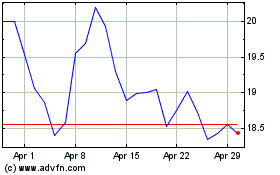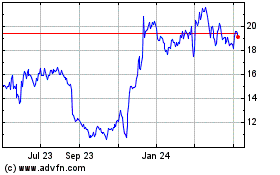By Dana Mattioli, Suzanne Kapner and David Benoit
Canada's Hudson's Bay Co. has approached Macy's Inc. about a
takeover, people familiar with the matter said, as the biggest U.S.
department-store chain grapples with disappointing results and
restive shareholders.
Talks between the companies are at a preliminary stage and also
encompass other ways they could cooperate, one of the people said,
adding that a deal for Macy's real estate is also a possibility.
Other details of the talks are unclear and it is far from
guaranteed there will be any deal.
Shares of Macy's jumped 7.4% to $33 in morning trading.
Hudson's Bay is an acquisition-hungry owner of marquee names in
retail including Lord & Taylor department stores and Saks Fifth
Avenue. While its market value is dwarfed by that of Macy's -- $1.8
billion compared with $9.8 billion as of Friday morning -- Hudson's
Bay could raise equity and debt against its real estate portfolio,
which could be worth $14 billion, one of the people said. It could
also bring in a partner.
But complicating a takeover, Macy's is saddled with about $7.5
billion in debt.
Macy's has struggled in recent years amid increasing competition
from upstarts and as shopping habits change and consumers buy more
over the internet. Its stock has fallen more than 50% from the
highest level it reached in 2015. In January, Macy's said it would
slash more than 10,000 jobs and detailed plans to close dozens of
stores after another weak holiday-sales season. It is facing
mounting investor pressure to turn around its performance and
reverse the stock drop. Starboard Value LP took a stake and called
on Macy's to hive off its valuable real estate, which the activist
investor says is worth more than $20 billion. Macy's later added a
Starboard ally to its board.
Macy's in June said its longtime chief executive, Terry
Lundgren, would step down later this year and hand the reins to one
of his top lieutenants, current President Jeff Gennette.
Hudson's Bay views Macy's as a healthy company with good cash
flow that just needs to invest more in its business, one of the
people said. Hudson's Bay is also considering potential deals with
other companies, this person said.
As of January, Macy's operated more than 800 stores. In addition
to its flagship Macy's stores, the Cincinnati company owns upscale
department-store chain Bloomingdale's. Its recent travails mark a
change in fortune for Macy's, which once was a dominant player in
retail that gobbled up competitors through a series of
acquisitions.
In 2005, Mr. Lundgren orchestrated the merger of the two biggest
chains, Federated Department Stores Inc. and May Department Stores
Co., creating a national retail giant that today is the largest
U.S. department-store chain.
Macy's was one of the brands owned by Federated, and the whole
company was renamed Macy's in 2007 as Mr. Lundgren eliminated
regional brands like Burdines, Filene's and Marshall Field's.
But the retail sector has been pressured in recent years by a
change in consumer habits. Department stores have been slow to
adapt to a shift toward online shopping, buying goods from
Amazon.com Inc. and so-called fast-fashion chains such as Zara and
Hennes & Mauritz AB. Declining foot traffic in shopping malls
as well as the ability for consumers to compare prices online
before buying products has hurt department stores.
At the same time, a bifurcation in shopping habits toward the
highest and lowest ends has been bad for retailers like Macy's that
cater to midrange customers.
In July 2015, Starboard made a public presentation that said the
stock market wasn't properly valuing the real-estate assets inside
Macy's. The activist, which held a 1% stake as of the end of
September, said the property was worth $21 billion, including $4
billion alone for the flagship Herald Square store on 34th Street
in Manhattan. It said the entire company was worth $33.7 billion,
roughly double the price at the time, but the stock has plunged
nearly 60% since then.
Last January, Starboard reiterated its case and said Macy's
could structure a joint venture, similar to the one Hudson's Bay
struck with Saks Fifth Avenue's flagship Manhattan property -- by
partnering with a real-estate investment firm.
Macy's has been selling some stores piecemeal, and recently
formed a joint venture with Brookfield Asset Management that could
enable 50 or more stores to be fully or partially redeveloped. But
the company has resisted a traditional sale-lease back of its real
estate portfolio -- as Starboard and others have advocated, saying
the move wouldn't be in its long-term interest.
Macy's had humble beginnings, starting as a dry goods store by
Rowland Hussey Macy on the corner of 14th Street and Sixth Avenue
in Manhattan in 1858. Over time, the store grew into a full-fledged
department store, and in 1902 it opened its Herald Square location,
according to the company's website. After going public in 1922, it
began to acquire other department stores. In 1994, Federated
Department Stores acquired R.H. Macy & Co.
Hudson's Bay Chairman Richard Baker has made a habit of
unearthing hidden value in the real estate of retail chains he has
acquired.
A year after the Canadian company bought Saks Fifth Avenue in
2013, its flagship store on Fifth Avenue was appraised for $3.7
billion -- more than the $2.9 billion Hudson's Bay spent to acquire
the entire chain.
Hudson's Bay has also formed joint ventures with mall owners and
property developers aimed at showing shareholders the value of its
real estate without selling it off.
In a 2015 interview with The Wall Street Journal, Mr. Baker said
many retailers aren't properly valued by the market because
investors don't fully understand the real estate they hold.
Write to Dana Mattioli at dana.mattioli@wsj.com, Suzanne Kapner
at Suzanne.Kapner@wsj.com and David Benoit at
david.benoit@wsj.com
(END) Dow Jones Newswires
February 03, 2017 11:14 ET (16:14 GMT)
Copyright (c) 2017 Dow Jones & Company, Inc.
Macys (NYSE:M)
Historical Stock Chart
From Mar 2024 to Apr 2024

Macys (NYSE:M)
Historical Stock Chart
From Apr 2023 to Apr 2024
